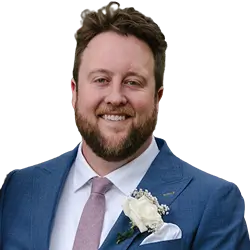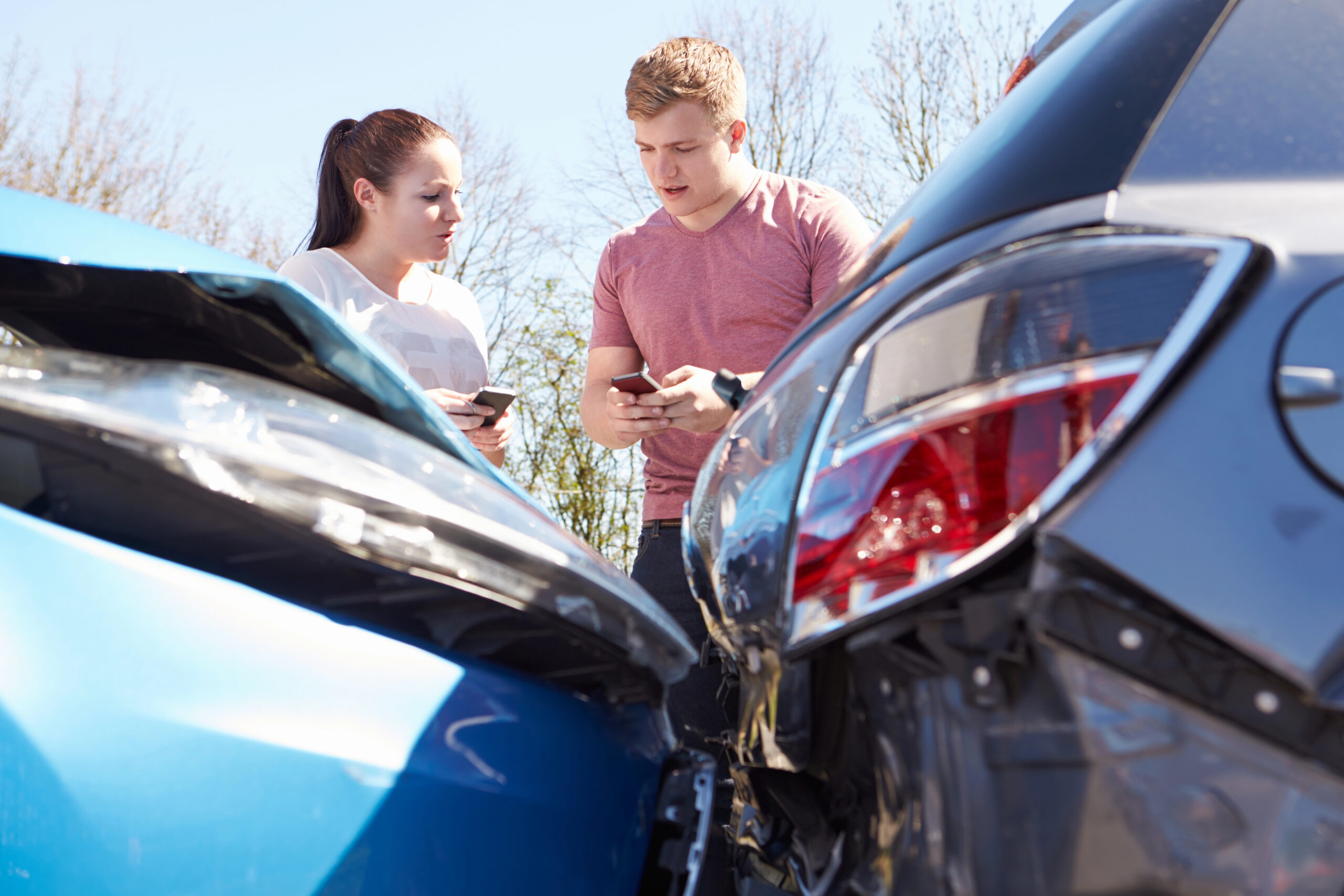Car accidents happen, but how does insurance work when an accident is not your fault? Understanding this process will help you navigate the claims process efficiently and better ensure you receive fair compensation for your losses or damages.
Steps to file a claim with someone else’s insurance
1. Collect evidence that the other driver was at fault
As soon as possible after an accident, get to the side of the road or another safe place. Then, if you’re able, begin collecting evidence about what happened.
- Take photos of the scene of the accident, including where the vehicles are located, any damage to the cars, skid marks on the road, weather conditions and traffic signs. Stay safe: Don’t go into the road to take pictures of the accident scene.
- If the police arrive, write down the officer’s name and badge number so you can follow up and get a copy of the accident report.
- Get the other driver’s information, including their name, phone number, driver’s license number, license plate number and insurance policy number.
- Write down the contact information of any eyewitnesses.
2. Notify your own insurance company that you were in an accident
Even if you don’t intend to file a first-party claim with your own insurance company, you should still notify them about the accident right away. They may be willing to help you with the claims process to collect from the other driver’s insurance company.
Additionally, if the other driver doesn’t have enough insurance to cover your damages and you need to file a claim under your own collision coverage, you may only have a certain amount of time to let your insurer know about the accident.
3. Gather medical bills and certified estimates of the damage
When you file your third-party claim against the other driver’s insurance company, they’ll expect a clear picture of what you’re asking them to pay. Keep track of all of your medical expenses, including lost wages if you have to miss work due to your injuries. Also, get repair estimates from a few certified repair shops.
4. Contact the other driver’s insurance
Gather all of the information you collected about the accident. Then, look online for the insurance company’s customer service or claims handling phone number.
When you reach a representative, let them know that you need to file a third-party claim because you were in an accident with one of their drivers.
5. Be prepared to wait
If the auto accident was clearly the other driver’s fault, their insurance company may be eager to settle with you. That means they’ll make an offer, and if you accept, the case will be closed and you likely will not be able to seek further damages from the other driver.
If fault is less clear, the other driver’s insurance company will request an investigation to try to prove that their policyholder was not responsible for the accident. This can take time, so don’t count on a speedy payout.
6. Sue the other driver as a last resort
If you can’t collect from either their insurance or your insurance, you may be able to take the other driver to court. If the damages are less than about $3,000 — the exact amount varies by state — you can sue them in small claims court, which may be faster than going through a traditional lawsuit.
Just keep in mind that if the other driver doesn’t have many assets, you may not be able to collect even if they’re found responsible for the damages.
The statute of limitations to file a lawsuit after a car accident is usually two to four years, depending on the state.
What will another driver’s insurance cover?
Insurance companies vary on how they handle third-party insurance claims, but here are some of the expenses they may reimburse you for:
Property damage
Property damage liability is a standard coverage included in almost all car insurance policies. With this coverage, if another driver causes an accident, their insurance will pay to repair or replace your vehicle, up to the driver’s policy limits.
Liability coverage limits vary by state
Each state has insurance laws that set a minimum property damage liability limit. In some states, that limit is as low as $5,000 — meaning if you’re in an accident with a driver who only has the state-minimum liability insurance, the most their insurance company will pay for your vehicle damages is $5,000.
Medical bills
In many states, bodily injury liability is also a standard insurance coverage — meaning an at-fault driver’s insurance will pay for medical bills resulting from an accident, including doctor and hospital fees, pain and suffering, and lost wages if you miss work for your injuries.
The state liability limits for bodily injury are set on a per person and per accident basis. So while the insurance company will pay up to a set amount for all of the injuries caused in a single accident, each individual involved in the accident will only be eligible to collect a certain amount under a bodily injury liability claim.
Some states limit bodily injury claims
In no-fault states, drivers are required to carry coverage called personal injury protection, or PIP, that will pay for their own injuries after an accident, regardless of who was at fault. In those states, you may only be able to sue the other driver (or their insurance company) for medical bills if the accident resulted in very serious injuries or fatalities.
Rental car
In some cases, the other driver’s insurance company will pay to arrange alternate transportation for you while your vehicle is in the shop for accident-related claims. However, this may vary by the provider, so double-check when you file your claim.
If the other company does not reimburse you for a rental car but you’ve purchased rental reimbursement coverage, your own insurance will cover the rental.
In some cases, it may be better to file under your own insurance
You may want to avoid filing a claim with your own insurance company because you don’t want your insurance rates to go up, but a not-at-fault accident claim won’t always increase your rates — and there are situations where going with your own insurance company can actually get you a better payout.
- If you have your own medical coverage: PIP and medical payments coverage (MedPay) are available in some at-fault states. If you have this type of insurance, it may be faster and simpler to have your medical expenses covered if you go through your own insurer.
- If the other driver is underinsured: If the driver’s coverage limits are too low to cover all of your damages, you may be able to file a bodily injury claim if you have uninsured/underinsured motorist coverage (UM/UIM). If you have collision coverage, you can file a property damage claim.
- If you want the process to be faster: Navigating the other driver’s insurance can sometimes be time-consuming, but filing a property damage claim under your own collision insurance should be faster. You will likely need to pay your deductible, but that may be reimbursed later by the other insurance company.
- If you live in a no-fault state: No-fault states require you to file bodily injury claims under your own PIP insurance. You can still file a property damage claim with the other driver’s insurance.
Even if your rates do go up after an accident-related claim, you may be able to help bring them back down by shopping around for a new car insurance company. Some insurers are more forgiving of accidents than others — especially if you weren’t at fault.
FAQ
-
Does a not-at-fault accident affect insurance? Will my insurance go up if I’m not at-fault?
-
How does insurance work when it’s not your fault?
-
What are some tips on filing an auto insurance claim?
-
Do you need a police report to file an insurance claim?
-
How long does an insurance company have to settle a claim?
-
Does the insurance company have to pay off my car loan?
-
How long do you have to file a car insurance claim?
-
Who do I have to call after a car accident?
-
Will the other driver’s insurance company pay for my rental car?
-
What if I don’t agree with the amount the other driver’s insurance company offers me for damages to my vehicle?

Megan Lee is an editor, writer, and SEO expert who specializes in insurance, personal finance, travel, and healthcare. She has been published in U.S. News & World Report, USA Today and elsewhere, and has spoken at conferences like that of NAFSA: Association of International Educators. Megan has built and directed remote content teams and editorial strategies for several websites, including NerdWallet. When she`s not crafting her next piece of content, Megan adventures around her Midwest home base where she likes to drink cortados, attend theme parties, ride her bike and cook Asian food.

Everett Cook is an award-winning journalist and editor with more than 10 years of experience across a variety of industries. In editing for Jerry, Everett’s mission is to help readers have a better understanding of the costs of owning or leasing a car and to better understand their vehicle in terms of insurance and repairs. Prior to joining Jerry, Everett was an editor for Axios. His previous work has been featured in The New York Times, The Los Angeles Times, The San Francisco Chronicle, The Atlantic, Atlantic Re:think, The Boston Globe, USA Today, and others. He’s also been a freelance writer and editor with experience in SEO, audience building, and long-term content roadmaps. Everett is a proud graduate of the University of Michigan.









